In Re:’s new weekly column a 22-year-old with minimal understanding of politics tries to work out what it all means. Zoe Madden-Smith unravels the machinations of politics and governance before the election on September 19th. Infographics and images by Liam van Eeden.
There has been a lot of buzz recently about what new minor parties are popping up and merging together. But if I’m honest, I didn’t even know half of them existed. In this week's column I’m figuring out who these minor parties are and what they’re about. Also, what needs to happen for them to get in power. There’s a lot to get through, but you can scroll down to see what each party is up to.
After writing about what the main parties stand for last week, a lot of you pointed out that I had missed out a number of parties. Well, you’d be right, I did. Good spotting.
It’s tough out here for a minor party. Getting recognition is a constant battle. And if I’m completely honest, I haven’t even heard of some of them. The way our parliamentary system is structured makes it pretty hard for smaller parties to get media coverage or on debate panels, let alone in the house. This is all because of the five percent rule.
But before we get into what the five percent rule is, it’s helpful to understand the difference between a party vote and an electorate vote. In September you will get two votes (not including the cannabis and euthanasia referendums, those are seperate).
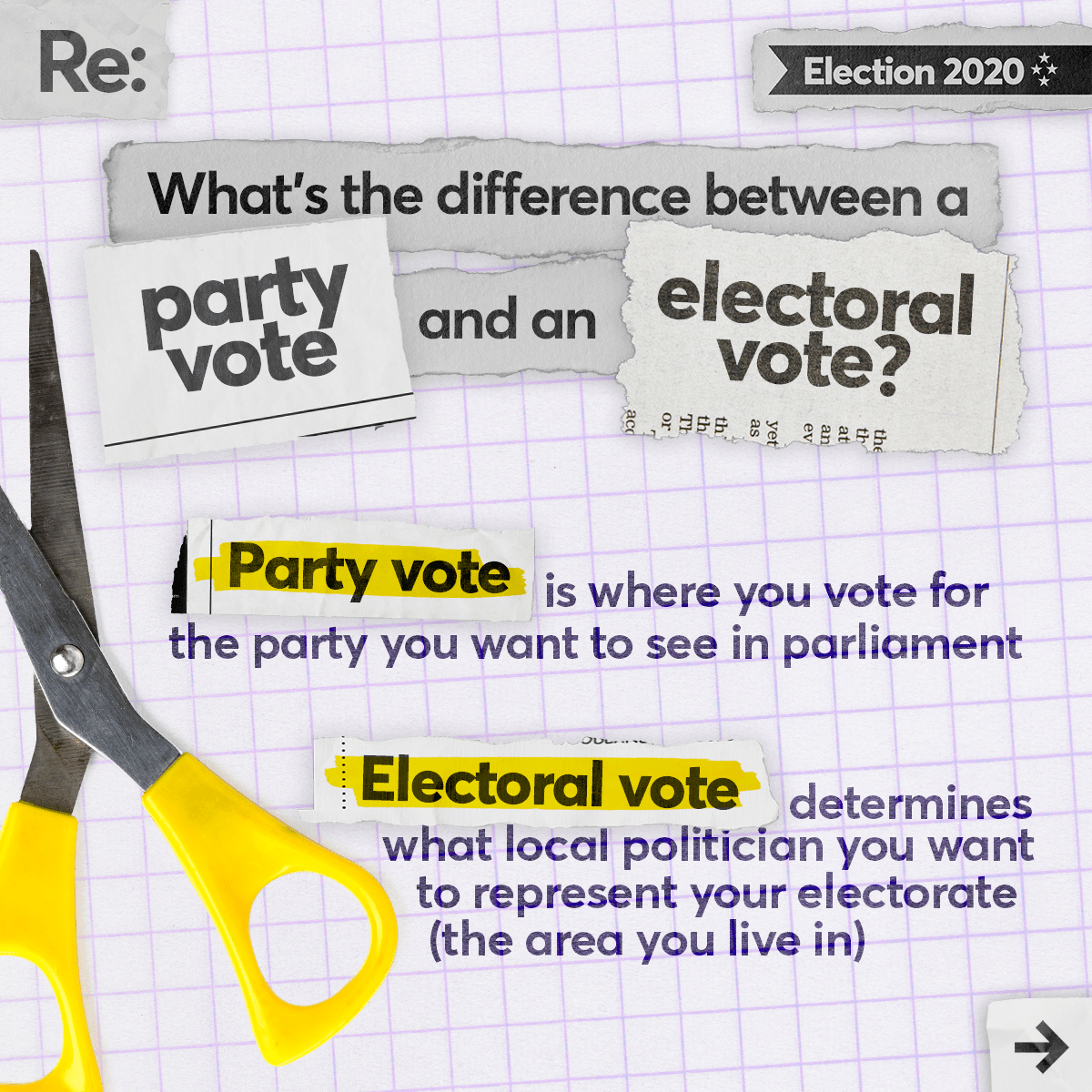
The first vote is called the electorate vote. This determines what local politician you want to represent your electorate (the area you live in). New Zealand is divided up into 71 electorates, 64 are general and seven are Māori electorates (also known as Māori seats), which are reserved for Māori representatives. So your electorate vote is pretty much saying, “I trust this person, I like where their priorities are, I think they should help lead what goes on in this area.”
The second vote is called a party vote. This is where you get to vote for your favourite party, the one you want to see in parliament.
How does a party get into parliament?
Okay, now moving onto the five percent rule. With MMP (Mixed Member Proportional, what our parliamentary system is called), there are two golden rules that control how parties get into parliament.
Firstly, if the party receives five percent or more of the party vote, they will get their share of the 120 seats in the House of Representatives, or in other words, they will be able to be in parliament and vote on decisions and help pass laws. So even if the party doesn’t win a single electorate seat, if they can get over the five percent line with the party vote, they are in. This often happens with the Green Party. In the 2017 election, they didn’t win any electorate seats but they were able to get 6.3 percent of the party vote, just scraping by and making it into the house.
But if, for example, a party gets 3 percent of the party vote there is still one way they can get in. They need to win at least one electoral seat. This is sometimes called the “coat-tailing” rule, and is the reason why ACT Leader David Seymour is in parliament. In the 2017 election, ACT won 0.50 percent of the party vote. But because David has some loyal fans in Epsom, he won his electorate seat, which was all he needed to get in. ACT is the only minor party that won an electoral seat in the 2017 election.
Why don’t we see much of the minor parties?
A lot of news companies have a rule where they will only invite parties that are polling at around 5 percent to join debates, which makes it difficult for minor parties to get more exposure and therefore followers.
For example, in the most recent 1 NEWS Colmar Brunton poll, only The Māori Party and New Conservative were polling at 1 percent each. The other minor parties don’t show up.
It’s also common for minor parties to not have the same deep pockets full of donations that big parties like National or Labour have, which limits how much they can advertise or travel round the country. So if you have never heard of some of these parties, that’s probably why.
Before we get into it, I also want to clarify that “minor parties” in this article does not include the Green Party, ACT or New Zealand First, even though they technically are minor parties. This is because they are already in parliament and so they attract a lot of coverage already. Below are all the other minor parties that are running and registered on elections.nz website. I have also included the New Zealand Public Party, which is not registered, but has caught a lot of people’s attention after their launch this week.
Unregistered political parties can only run in an election by standing electorate candidates. They cannot run for the party vote. A candidate standing on behalf of an unregistered party may have the name of the party listed on the ballot paper with their name, but not a party logo.
Please be aware that each party has more policies then I will mention, so if you are interested in a certain party I would encourage you to visit their website for more information.
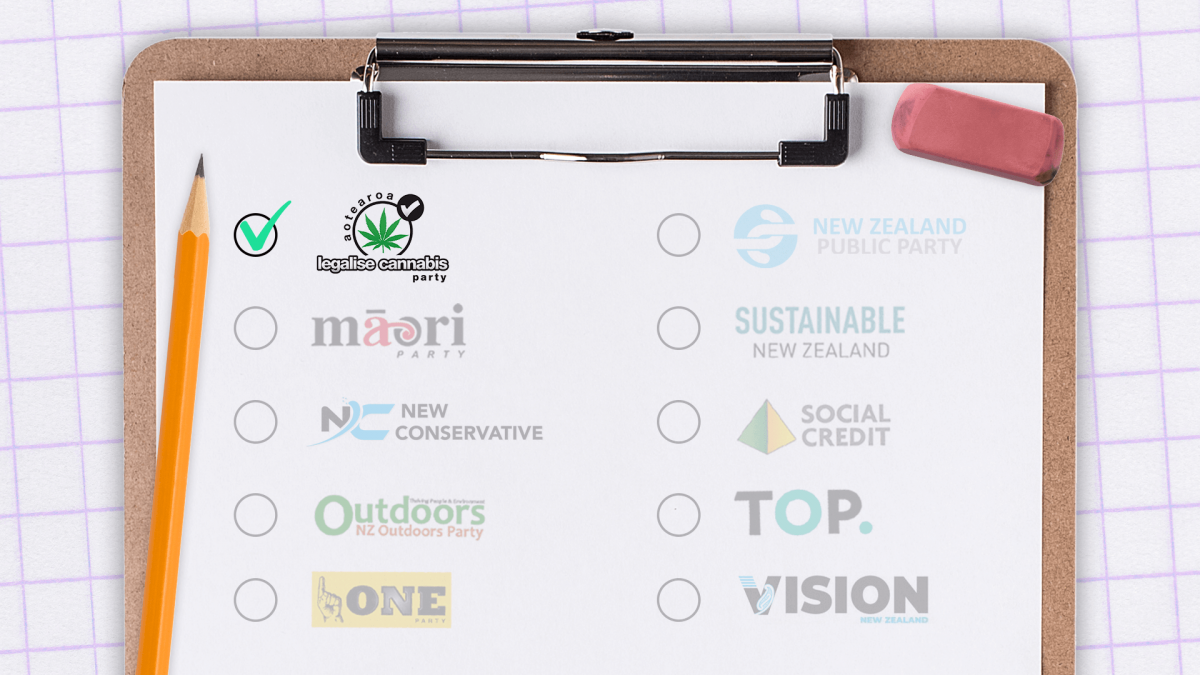
Aotearoa Legalise Cannabis Party
Leader: Jeff Lye
Slogan: “Truth. Freedom. Justice.”
Who are they?
Aotearoa Legalise Cannabis Party’s (ALCP) is a single-issue party founded in 1996 to legalise and regulate cannabis. But 1996 was also the year they peaked, when they received over 34,000 thousand votes (1.66 percent of the party vote). Now that cannabis reform is on the agenda of more mainstream parties, their votes have slipped. At the last election they received just 0.31 percent of the party vote.
What are their biggest priorities?
Legalise and control cannabis
Judging by the lack of policies on their website, the party seems to be mainly concerned with the cannabis referendum this election. The website gives you facts and figures on the benefits of cannabis, and encourages voters to vote yes in the referendum.
The party believes drug use should be treated as a health issue, not a criminal one. They argue the money spent on prohibition and criminal punishment could be spent better elsewhere. “We ask what would New Zealand look like now if this money had been spent where it is needed in health, education and infrastructure development?” leader Jeff Lye said in a statement in 2017.
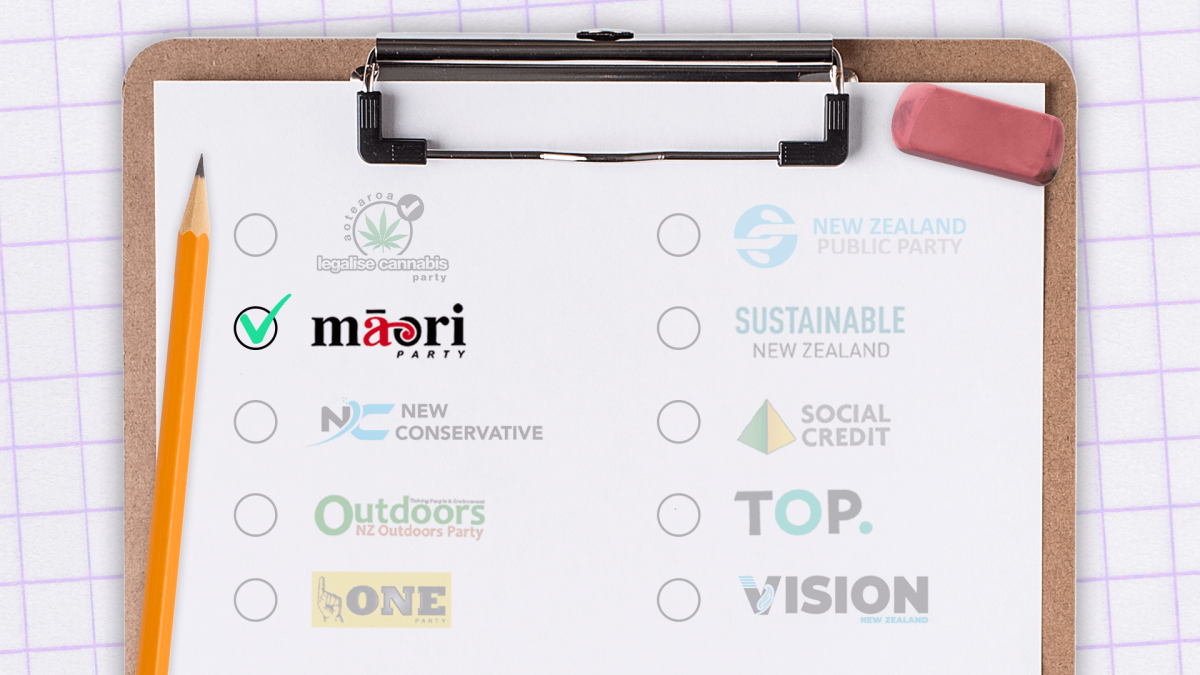
Māori Party
Leaders: John Tamihere and Debbie Ngarewa-Packer
Slogan: “Believe in you. Believe in Me.”
Who are they?
The Māori Party is an indigenous-rights focused party that sits centre-left on the political spectrum. The party was founded in 2004 by Dame Tariana Turia after she resigned from the Labour Party in protest against their foreshore and seabed law (which gave ownership rights to the Crown instead of Māori).
Each election the party has secured about one or two percent of the party vote. But the last election in 2017 was the only time the Māori Party failed to win any electoral seats, meaning they were left out of parliament for the first time. Māori has now merged with the Mana Movement (a second Māori-rights focused party), to avoid splitting the Māori vote.
Their policies and practices are derived from kaupapa tuku iho, (values passed down from tūpuna Māori) and aim to provide wellbeing for all, but particularly focus on achieving equality and equity for Māori as tangata whenua.
What are their big priorities?
“Whānau First” approach to Covid-19 recovery
Māori Party will guarantee 25 percent of all government projects in the next two years will be Māori-led recovery projects, involving Māori workforces, partnerships with hapū, iwi and whānau and funding for Māori-owned services and businesses.
They will emphasise that all Covid-19 recovery bodies should reflect the Te Tiriti relationship in their structure and membership. As well as enhance the country’s fresh water, land, oceans and protect the “rights and interests of the natural environment.” They propose their Covid-19 recovery will also address the systemic racism, poverty, and high unemployment rate among Māori and other hardships that disproportionately affect Māori.
‘Iwi Build’ housing initiative
Iwi Build, a Māori-led housing project, will remove the legal barriers to build on papakāinga (shared ancestral land), build partnerships between Māori, hapū and whānau collectives and fund environmentally friendly housing initiatives to support low income families.
To achieve this, Māori Party wants 25 percent of the total government housing budget to be allocated towards Māori trade trainees, businesses, providers and services. As well as 25 percent of all government funding for environmentally friendly housing initiatives to also be targeted at the Iwi Build project.
Reclaiming Māori rights to fresh water
The Māori Party want to overturn the Crown’s position that “everyone owns water” and instead acknowledge the intrinsic whakapapa and “proprietary, customary, and decision-making rights and interests” of Māori when it comes to freshwater. They will also fund Māori communities to protect and restore catchments and aquifers.
Other policies include:
- End new offshore oil and gas permits and withdraw from existing offshore and onshore gas and oil permits within the next five years.
- Ban seabed mining permits nationwide.
- Establish a $1 billion scheme to help whānau, iwi and Māori businesses invest in clean energy projects, fund the installation of solar panels and insulation for marae, kura, whānau homes and papakāinga housing developments.
You can read more about Māori Party’s policies here.
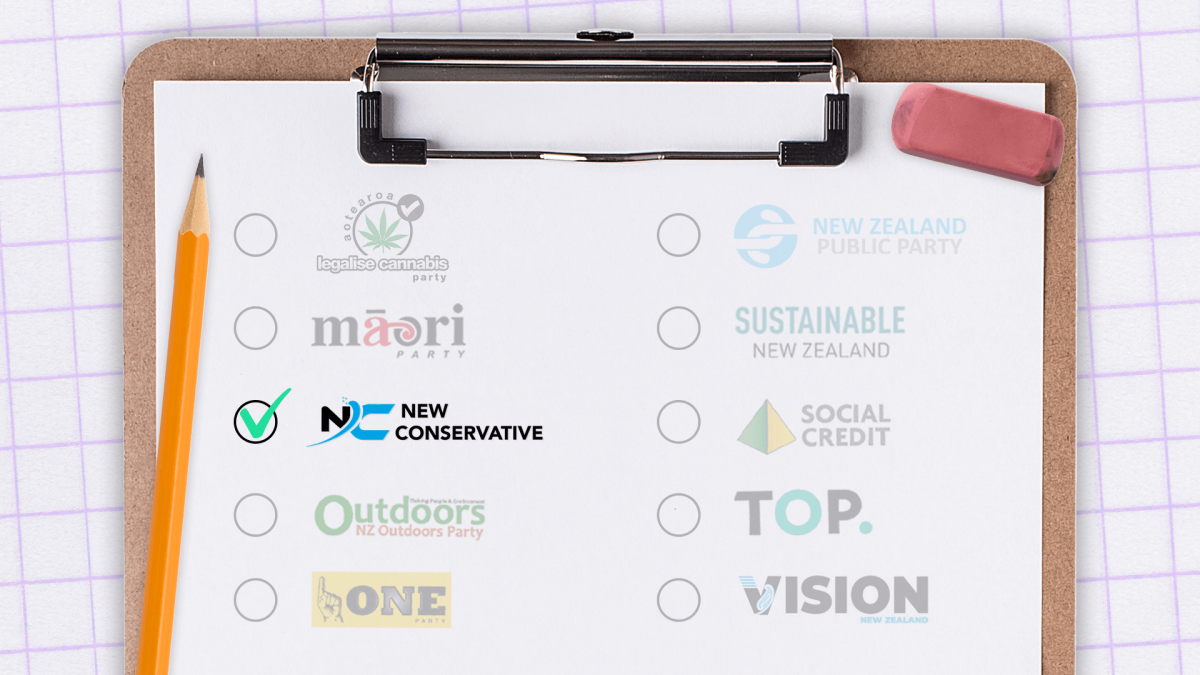
New Conservative Party
Leader: Leighton Baker
Who are they?
New Conservative is a right-wing socially conservative party founded in 2011 by businessman Colin Craig. The party is focused on cutting taxes, supporting rural communities and local business and prioritising the primary sectors (farming and mining) over the environment. The party does not support gay marriage, euthanasia or abortion.
What are their big priorities?
Put New Zealand first in the Covid-19 response
In order to “retain the billions of dollars we have borrowed during the Covid-19 lockdown”, New Conservative wants the government to support New Zealand businesses before sourcing offshore, prioritise value-added exports and tax imports that are non-essential or have high waste value. The party also wants to stop the sale of land, businesses, and assets to offshore buyers.
Protect the farming industry
New Conservative sees the farming industry as one of New Zealand's biggest assets. They will protect productive farmland from urbanisation, and repeal the ongoing policy for converting productive farmland into pine forests. Freshwater and waterway management compliance costs and overheads will also be reduced.
They also want to introduce fines for breaches of biosecurity that pose a risk to the primary sector. And fines for environmental breaches in the industry will be used to repair and prevent further damage.
Opposed to euthanasia
New Conservative is against euthanasia, but has to accept the outcome of the public referendum either way. Regardless of the results, the party will increase funding for palliative care and support for families looking after the terminally ill.
Tax cuts
New Conservative want $10 billion in tax cuts. Income up to $20,000 per year will be tax free (currently we don't have any tax-free threshold - our lowest tax bracket is for income under $14,000 which is taxed at 10.5%). Families will also be able to split their income to take advantage of low tax brackets. For example, under New Conservatives tax reform, if a family has one income source of $80,000 a year, this would be taxed 30 percent. But if the income is split into two (making it $40,000) it will only be taxed 17.5 percent. Petrol taxes will also be reduced.
Back out of environmental agreements and get back to mining and drilling
New Conservative want to repeal the Emission Trading Scheme and Zero Carbon Bill and provide support to farmers who have been impacted. New Conservative also want to abandon The Paris Agreement (the global response to address climate change).
The party also wants to reverse the ban on drilling and pursue the exploration and exportation of New Zealand’s oil, gas, and coal assets, instead of importing these natural resources.
Other policies include:
- A full repeal of the post-Christchurch terror attack gun-laws
- Repeal of prisoners right to vote
- Net zero immigration until housing stock increases
- The party believes marriage can only be between “one biological man and one biological woman”. Their marriage policy would encourage couples to go through state sponsored “relationship training” and counselling sessions.
- KiwiSaver contributions will no longer be taxed as personal income
- Minimum wage freeze
- Gradually increase the age for NZ Superannuation to 70 by 2070
You can read more about New Conservatives’ policies here.
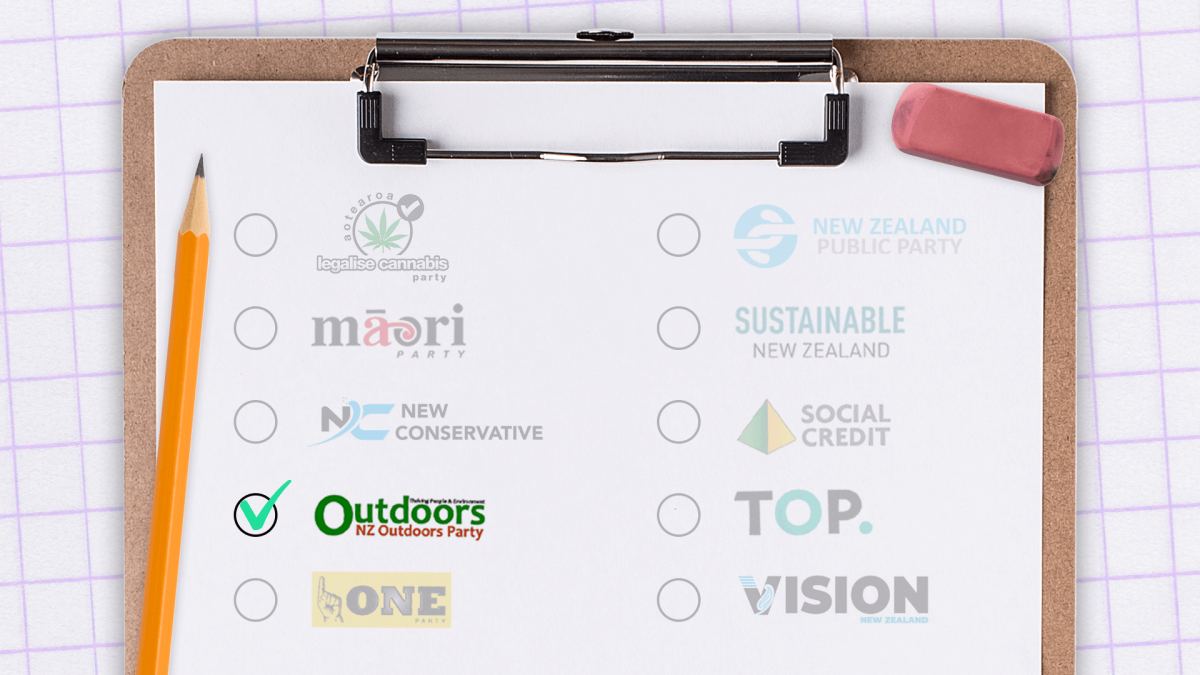
NZ Outdoors Party
Leader: Alan Simmons
Slogan: “Thriving people and environment”
Who are they?
NZ Outdoors Party is an environmentalist party founded in 2015 to take “better care of our water, land, soil, wildlife and of our people.” In 2017 (the only election they have run in) they only managed to secure 0.1 percent of the party vote and missed out on winning any seats in parliament. The NZ Outdoors Party has an wide list of policies on their website ranging from sustainable agriculture and health, to firearms and 5G. Here are some key points.
What are their big priorities?
Protecting New Zealand’s nature and water and banning 1080
The key priority of the NZ Outdoors party is to protect New Zealand’s environment. They want the farming industry to follow “regenerative agriculture”, to introduce new criteria that would control what land can be cleared and restrict foreign ownership of our forestry industry.
They want to ensure every New Zealander has clean water, and all rivers are swimmable to a drinkable level. They also want to ensure there is no privatisation or ownership of water and pest control around water sources is done with non-poison methods.
They want to stop the use of 1080 “immediately”.
Reintroduce banned firearms and enforced stricter rules
The party, led and supported by hunters, opposes the gun buyback scheme that was introduced after the Christchurch terror attack. The party also opposes a gun register that would help officials know who owns what type of firearms. NZ Outdoors Party wants to reintroduce firearms, including semi automatic rifles, for hunting and sport that were banned under the 2019 amendment of the 1983 Arms Act. They would also enforce stricter licensing endorsements and safety criteria to own a firearm.
Right to refuse “mandatory medication” and invest in natural medicine
The party is against mandatory medication (like vaccines) and encourages health and well-being through “healthy lifestyle, good nutrition and a connection with nature”. They want to fund medical centres that provide conventional as well as natural medicine.
Other policies include:
- The party believes the use, cultivation or possession of cannabis for personal or medical use should not be a criminal offence.
- Postpone the roll out of 5G towers until there is a public inquiry into the long term impact on “human health and the wider biosphere.”
- As part of their anti-fluoride stance, they want to subsidise adult dental treatment, and education on good dental hygiene and nutrition will become part of primary and high school curriculum.
- Increase pay rates for midwives, introduce an “on call allowance” and payment for travel based on mileage.
- Remove provisional tax for businesses and increase the GST threshold to make it easier for people to start new businesses.
You can read more about NZ Outdoor’s policies here.
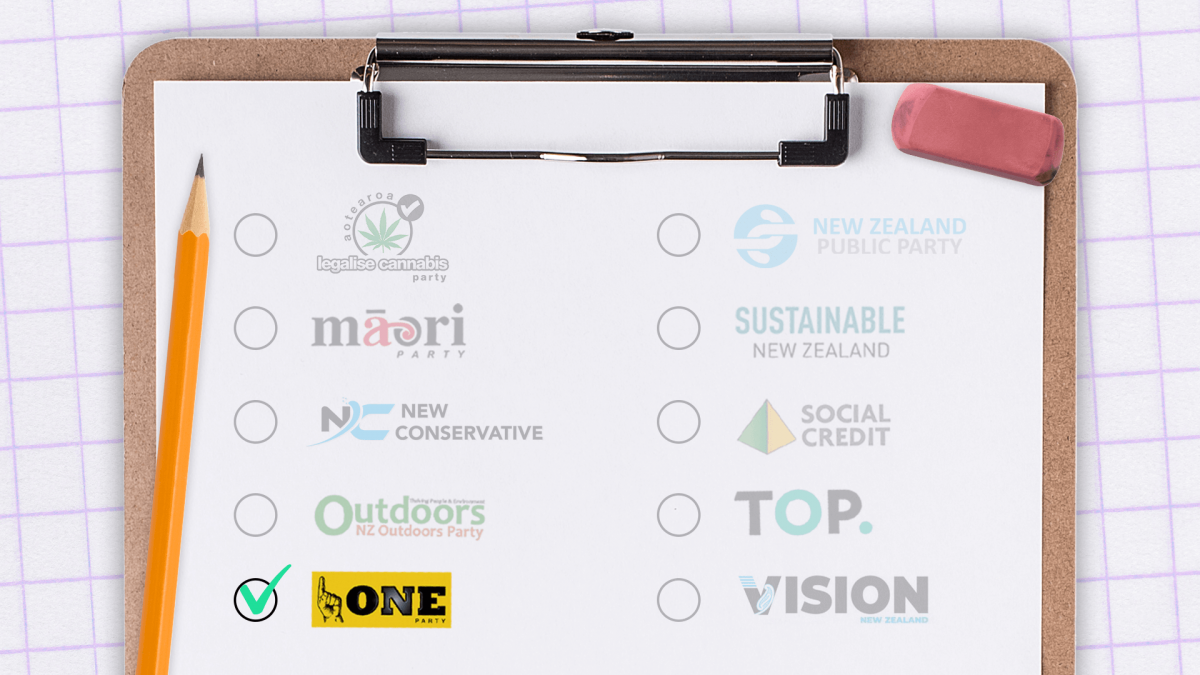
ONE Party
Leaders: Stephanie Harawira and Edward Shanly
Slogan: “Vote for a better future”
Who are they?
Launch earlier this year, ONE Party is a Christian party with socially conservative views on topics like abortion, euthanasia and immigration. The party believes that if “one million Christians vote in one accord” there will be a “kingdom shift”. Their mission is to: “To stir the hearts of the nation to arise and pursue righteous change in Aotearoa New Zealand.” Co-leader Stephanie Harawira is a well-known anti-synthetic drugs activist. Her son, Kahu, was 29 when he died from heart failure after overdosing on synthetic cannabis.
What are their big priorities?
Support a ‘Strike Three Drug Rule’
Like a lot of parties, ONE Party believes drug use is a health issue, not a criminal one. But their approach to rehabilitation isn’t voluntary at all. Although they support cannabis reform, they don’t exactly want New Zealanders blazing for the fun of it. Instead they want to enforce the ‘Strike Three Drug Rule’.
If someone is caught getting high, they will be issued a strike one caution and given health information. Caught again? The person will get a strike two and have to attend a recognised treatment programme. If the person doesn’t show up to this treatment programme, that is strike three - they will be forced to take part in an instant six-week mandatory “Boot Camp Recovery” programme.
The Strike Three Drug Rule also applies to the possession of drug paraphernalia. Strike one is an instant fine of $1,000. Strike two is a $2,000 fine and strike three is a $3,000 fine. Further strikes will require the person to attend a treatment programme, but a breach of attendance will result in an instant 6 week mandatory ‘Boot Camp Recovery’.
ONE Party wants to increase funding for prevention, education, harm reduction, treatment programmes and Boot Camp Recovery centres. They do not support regulated commercial supply or licensed cannabis outlets and still believe it should be a crime to sell cannabis and all other illicit drugs.
Oppose the decriminalisation of abortion
ONE Party wants to “amend the law to protect unborn children from conception to natural death”. They propose the Life Act Fetal Heartbeat Bill, which would prohibit doctors from performing an abortion after six to seven weeks (when you can first hear a heartbeat) unless the mother’s life is at risk or there is a risk of substantial and irreversible impairment.
ONE Party wants all women to have access to free scans. Teenage mothers will have access to schooling, free doctor’s visits, counselling, pregnancy help and resources. Teenagers wanting to keep their baby will also have access to safe homes and support services.
Tightening immigration rules
ONE Party believes there needs to be a focus on allowing skilled migrants into the country to create jobs and incomes for New Zealanders.
To become a resident, migrants will need to prove they have contributed at least five years of paid work in New Zealand (the current requirement is two years). ONE Party also wanted to extend the qualifying period for NZ Superannuation from 10 years to 20 years. Residency applications will test migrants on New Zealand’s constitutions and the Treaty of Waitangi.
Other policies include:
- Rejecting the End of Life Choice Bill, which would legalise euthanasia of terminally ill people. Instead, they will increase funding for palliative care services and support services for those caring for terminally ill loved ones.
- Schools must give parents two weeks’ warning before sex education classes, and parents can remove their children without penalty. ONE Party will review all sex-education syllabus material and Local Boards of Trustees will have the final say on what is appropriate. This would mean different areas of New Zealand would be able to control what sex education children have access to.
- Increase funding for building affordable new homes, the development of emergency shelters in all the main cities, and a funding boost for wrap around social services to reduce the amount of homelessness in New Zealand.
- Protect freedom of speech.
You can find out more about ONE Party’s policies here.
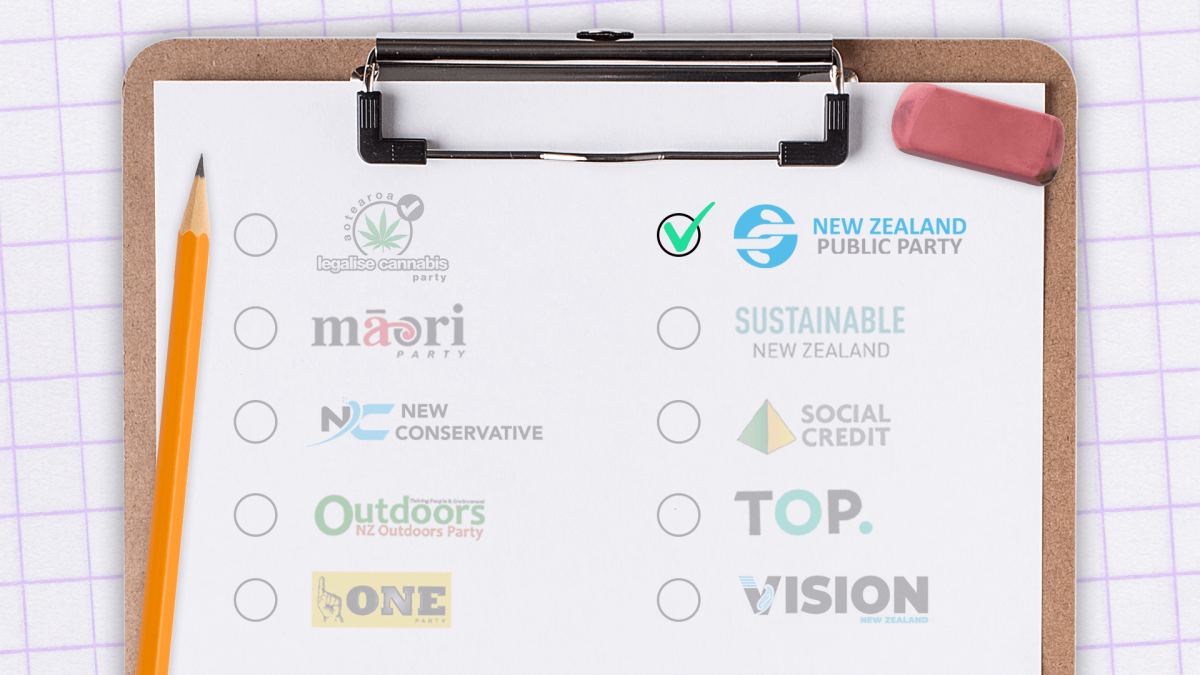
New Zealand Public Party (not registered)
Leader: Billy Te Kahika
Slogan: “Reclaim New Zealand for all the people”
Who are they?
New Zealand Public Party (NZPP) is a quickly-growing party with a surprisingly large social media following, that has been criticised for peddling conspiracies including saying that Covid is a hoax. Their policies are largely focused on restoring democracy and trust in the government. Earlier this month the party announced it will merge with former National MP Jami-Lee Ross’s Advance New Zealand Party. Advance New Zealand will act as an umbrella for other small parties, so if you like the sound of NZPP, you can party vote for Advance NZ. You can find out more about Advance New Zealand here.
What are their biggest priorities?
Rebuilding New Zealand’s democracy and writing a new Bill of Rights
NZPP “will rebuild New Zealand back into a democracy” by rewriting the Government Constitution, writing a People’s Constitution and a “real Bill of Rights”.
This new Bill of rights will give the Treaty of Waitangi a “chance to be heard and understood without an agenda”. It will also lay down a legal framework that prioritises the “people's right to safety” over corporate profits. The party’s safety concerns include: “5G, fluoridation, vaccines, pharmaceuticals, poisons, 1080, electromagnetics, industrial products and waste, consumer products, food products.”
The Bill of Rights will also serve as a legal framework to protect the environment from “farm chemicals and waste, pest-control poisons (1080), GMO’s insecticides, fertilisers, waterway and land usage.” The Party demands a full investigation into 1080 and “it’s abuse”.
Repairing the economy and business after Covid-19
NZPP says they will have a “sensible approach” to handling the “financial disaster” left after Covid-19, but they are yet to explain what this would actually look like. The party says before they get started they need a clear picture of what the previous governments “have gotten us into.” They are urging the government to release everything that happened within Parliament, Treasury, and the Reserve Bank during the Covid-19 response.
Healthcare should be about prevention rather than intervention
The party believes “natural human immune system boosting options should be of equal importance in the medical sphere”, and healthcare should be about prevention rather than intervention. They want to review all agreements between the government and drug companies and appoint an independent board to research these contracts and the products being traded.
The party will reject any current or future policies that enforce mandatory medication. They want to repeal the "Covid-19 Public Health Response Act" out of concerns it will lead to mandatory vaccines.
Repeal the decriminalisation of abortion
NZPP does not support abortion, and believes "the rights of the person extend to that of the unborn”. However, they do recognise there could be reasons for abortion in extreme cases such as rape, unsafe pregnancy and other health reasons. The party believes everyone has the right to prevent pregnancy through contraception and will fully fund contraception and further contraception research.
Other policies include:
- Remove all UN agendas and agreements from government and society.
- Restore government integrity through a new Government Constitution that includes transparency as a legal requirement to all levels of government, and legally requires the government to produce Checks and Balances.
Read more about New Zealand’s Public Party’s policies here.
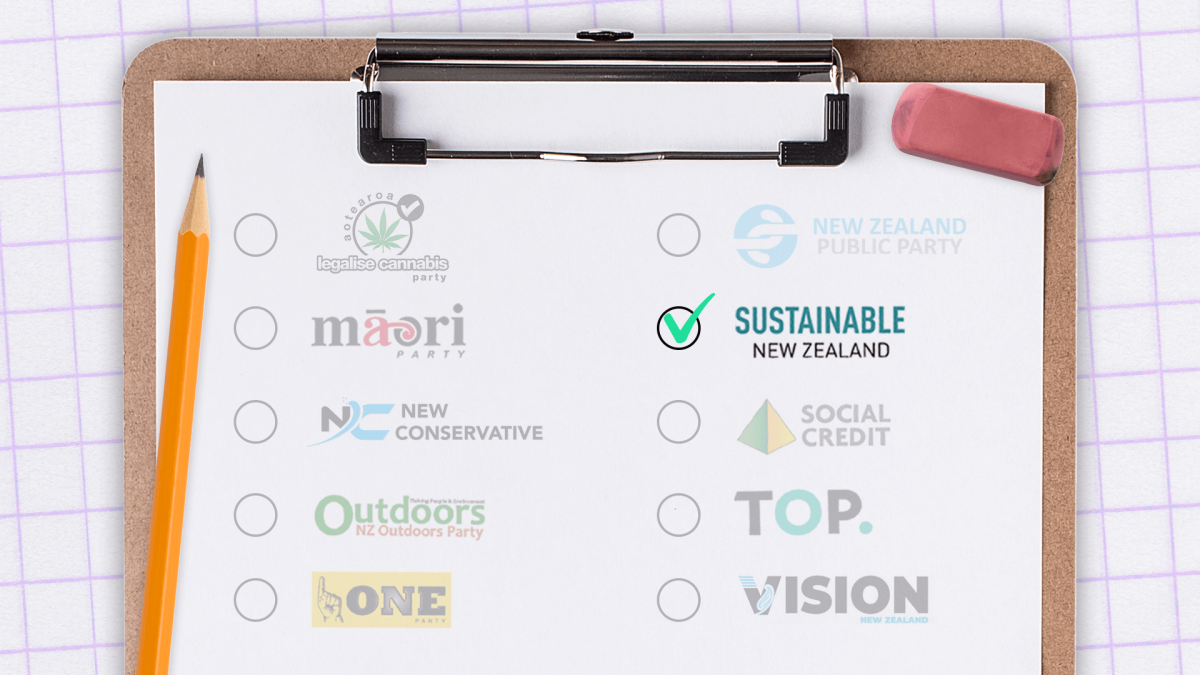
Sustainable New Zealand Party
Leader: Vernon Tava
Who are they?
Formed in 2019, Sustainable New Zealand Party is an environmentalist party focused on protecting endangered species, cleaning up our waters and sustainable economic growth. The party was started by Vernon Tava, who is a former Green Party member. He has attacked the Green Party for only wanting to work with Labour/the left and for putting social issues before the environment. He says his party will work with both sides of the political spectrum and will be a “full-time environmental party”.
What are their biggest priorities?
Sustainable New Zealand Party lay out their three biggest priorities as:
“Our top priority is safe, healthy water that sustains life”
Sustainable New Zealand Party wants to clean up fresh water supplies by investing in stormwater and wastewater treatment, reducing the amount of sedimentation and run-off through improved land management and encouraging commercial marinas to have safe cleaning facilities. They want to create a Minister for Water position and get councils, health boards and government departments to work together more efficiently.
They also want to protect ocean waters by installing cameras on fishing boats to incentivise sustainable practices, establish more ocean sanctuaries and invest in our navy and air force to defend the ‘Exclusive Economic Zone’ and protect our waters.
“To save our native species from extinction”
The party wants to invest $1 billion in conservation and implement a new Biodiversity Strategy. They will support scientific advances in pest and disease control and community groups and farmers will receive funding to manage pests and weeds on a local level.
“We will create sustainable economic growth”
The party is also focused on switching the economy to a more sustainable model, both financially and environmentally. One way they want to stimulate the economy is through accelerating the application process for science and business innovation and boost funding for start ups and business developments.
Instead of taxing wealth like some parties are talking about, Sustainable New Zealand wants to tax ‘bads’ like pollution, waste and overconsumption to take some weight off ‘goods’ like income, savings and profits.
Other policies include:
- Stopping fertile soils and wetlands from being developed on
- Introduce congestion charges for private transport in populated areas
- Increase community and state housing for families and encourage the option of having shared ownership
Read more about Sustainable New Zealand’s policies here.
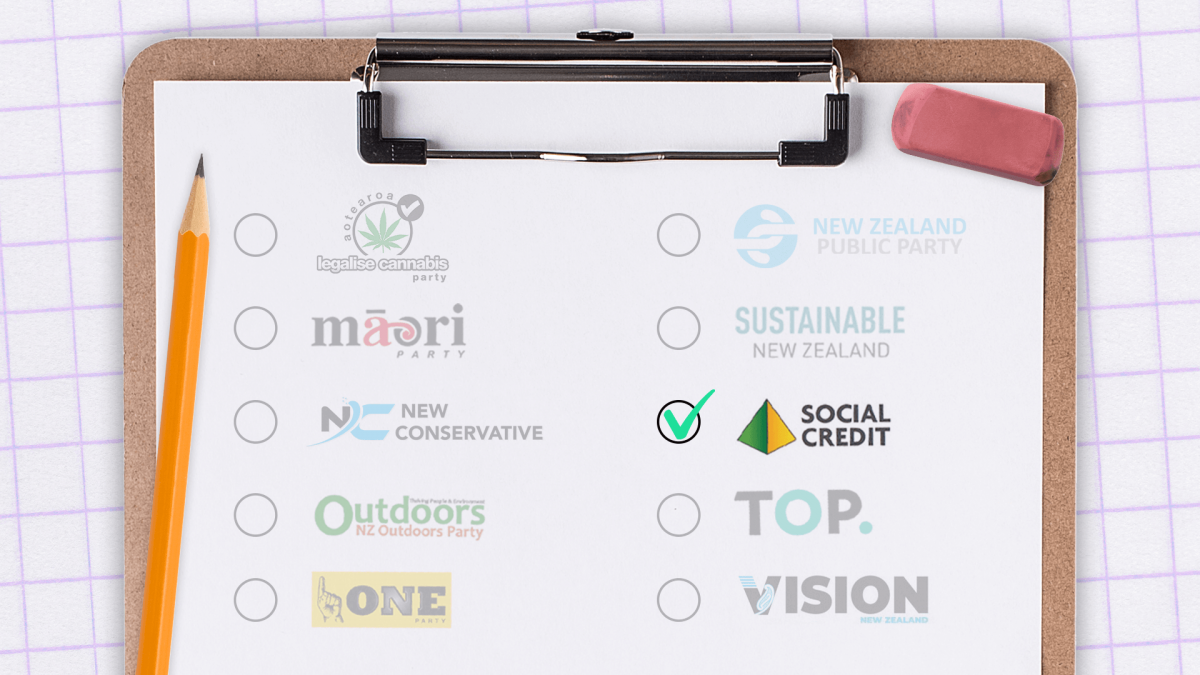
The New Zealand Democratic Party for Social Credit
Leader: Chris Leitch
Slogan: “Here for good”
Who are they?
Social Credit Party is a centre-left political party with progressive views on social welfare, tax and the environment which was founded in 1953. Back in their heyday (1950s-1980s) they were New Zealand’s “third party” and secured 21 percent of the party vote in 1981. But in more recent times they haven’t been so popular, struggling to get even 1 percent of the party vote since 2005. The party is based on the economic theory of social credit, meaning its policies focus on distributing economic wealth and political power to individuals.
What are their big priorities?
The Social Credit Party has an extensive list of policies, here are a few.
Implementing the “Toolkit for a new economy”
The Social Credit Party has put forward a comprehensive “Toolkit for a new economy”. The key actions would be giving New Zealanders access to interest free loans from the sovereign New Zealand Credit Authority (NZCA) and the issuing of new money from the NZCA to be spent into circulation by the New Zealand Government.
Reduce poverty with a universal income
To address the poverty many face in New Zealand, the party wants to ensure every New Zealand citizen has an “adequate living income”. This would replace all current benefits and everyone would be entitled regardless of “employment, marital, or gender status.”
Support New Zealanders into home ownership
Social Credit Party will make low-interest loans accessible to help first home buyers, young or low income income families into home ownership. Funding will also be made available to improve older homes with energy-saving and water-saving devices, and solar panels. They also want to expand state owned housing stock and invest in building more affordable homes.
Other policies include:
- Stopping the use of 1080 as soon as possible
- Ban 5G technology in residential and populated areas
- Creating a publicly-owned transport system
- Stopping the privatisation of prisons and boosting police numbers
- Implementing a publicly-funded health care system.
You can read more about the party and their policies here.
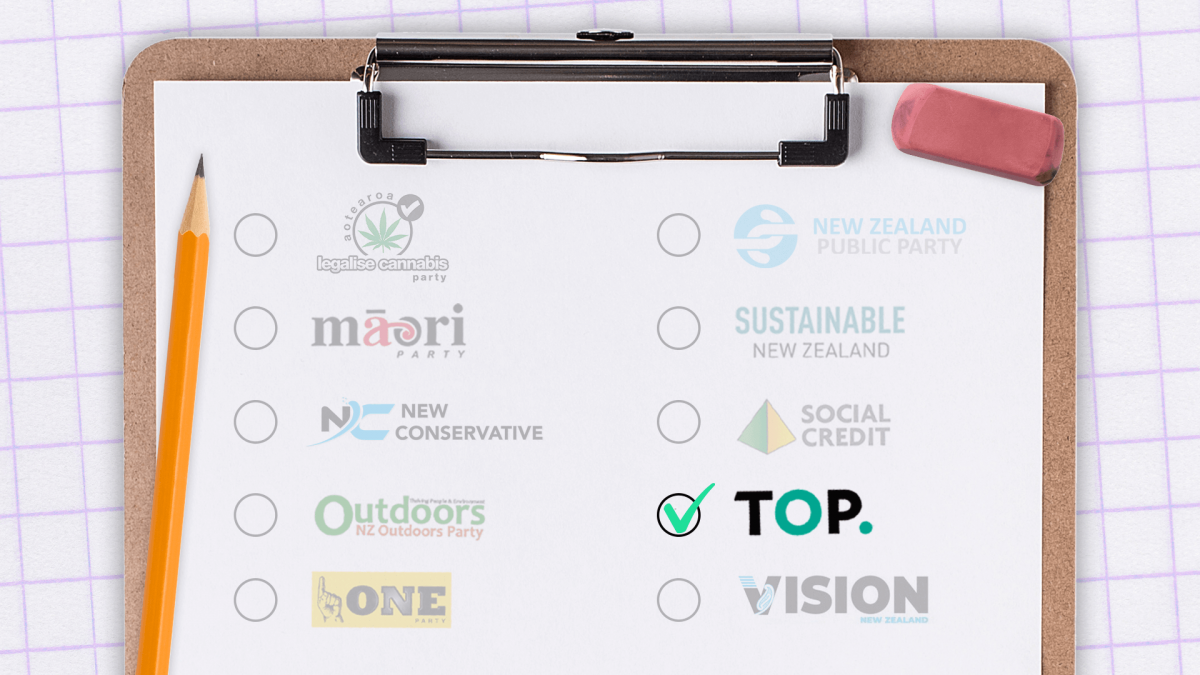
The Opportunities Party
Leader: Geoff Simmons
Slogan: “Vote different”
Who are they?
The Opportunities Party (TOP) is a centrist political party. It was founded by economist and businessman Gareth Morgan in 2016, but he quit the party last year after a dispute about where the party should spend his sizable donations. The party prides itself on their “evidence based” policies that have a particular focus on welfare, tax, the environment and the criminal justice system. The party won 2.4 percent of the party vote in 2017, but no electoral seats.
What are their biggest priorities?
Implementing a universal basic income
TOP wants to implement a universal income of $250 a week (which would be $13,000 a year)
in order to reduce poverty, encourage people to retrain and start new businesses as well as honour unpaid roles like carers and parents.
Legalise, regulate and tax cannabis
TOP’s cannabis reform policy, called “The Real Deal”, aims to address and reduce the harm caused by cannabis while capitalising on legalising it. “Making cannabis legal is projected to free up $180m in police resources, which can be reinvested to reduce crime, and as well generate at least $150m in revenue. That buys a lot of drug education and rehabilitation,” the policy reads.
TOP wants to licence select suppliers and manufacturers and encourage them to supply on a small and regional scale. They will set a minimum price and use tax to avoid prices falling. They will also prohibit cannabis from being sold at the same stores as alcohol, allow people to grow two plants at home and set the legal age to 20, but ensure education campaigns discourage use before 25.
Protecting water
TOP is determined to make all rivers swimmable and cease all intensification of land use (unless the impacts on the environment can be offset). They also want to invest in researching, monitoring and improving water quality and resolving Treaty water claims. This will be funded by a levy that commercial water users and polluters have to pay. The party wants 10 percent of all ecosystems to be set aside as no-take reserves to protect wildlife.
Flat tax rate of 33 percent
Instead of having a staggered tax bracket system, TOP wants to tax all income and entities by 33 percent. 33 percent is currently New Zealand’s highest income tax bracket, which kicks in if you make $70,000 or more.
Other policies include:
- Reducing the prison population by 40 percent
- Charging tourists a $20 levy to enter the country, this will be spent on upgrading infrastructure and protecting biodiversity
- Removing New Zealand’s regulations against gene modification and speeding up the approval process for scientists to use gene editing
- Increasing renters rights by limiting the reasons a landlord can evict someone
- Restricting net immigration to 1 percent of the population growth per annum and for only skilled migrants.
- Providing free full-time early-childhood education
- Eliminating fossil-fuel use in New Zealand by 2050
Read more about TOP’s policies here.
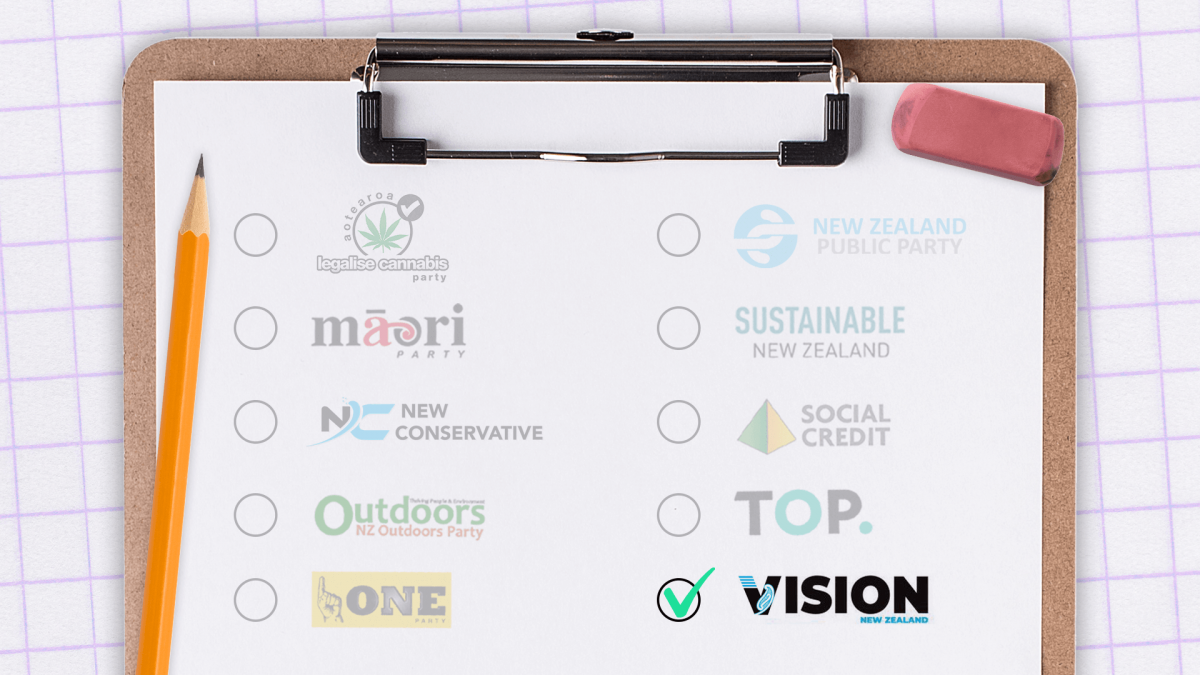
Vision New Zealand
Leader: Hannah Tamaki
Slogan: “Let’s take New Zealand back”
Who are they?
Launched in 2019, Vision New Zealand is a right-wing Christian nationalist party that is led by Hannah Tamaki, the controversial co-leader of Destiny Church. The party has conservative views on immigration, multiculturalism and the LGBTQI community and vows to represent the “silent majority” on those issues.
What are their big priorities?
Restricting immigration and migrant rights in New Zealand
Vision New Zealand wants to reduce the refugee quota and enforce a zero net migration target immediately for a period of 24 months. After 24 months, they will review and adjust this depending on the state of housing and labour shortages, health, infrastructure and social welfare systems.
Only New Zealand citizens will be allowed to vote and be eligible for NZ Superannuation, excluding residents who are currently able to do both.
Stop selling fresh water to foreign bottle companies
Vision New Zealand wants to stop any more water bottling consents being granted to foreign companies and buy back all foreign-owned water entitlements from existing users. They will also prioritise the resolution of Māori rights over fresh water and invest in cleaning up our waterways.
Ban the building of mosques, temples and “other foreign buildings of worship”.
As a Christian political party, Vision NZ promised to ban the construction of new "mosques, temples and other foreign buildings of worship", if elected.
"They are not us and we are not them," Hannah Tamaki told Newshub. "I do not believe there is room in our society to allow for parallel cultures, faith or customs.”
Freedom of speech
The party wants to repeal or block any proposed Hate Speech Law reforms and regulate the New Zealand media so that there is more balance between liberal and conservative viewpoints.
“Many Liberals consider opinions that oppose theirs as ‘hate speech’,” the Vision New Zealand policy reads. “They invented Hate Speech to protect their own hateful and personal opinions.”
Other policies include:
- “Retaining New Zealand’s sovereignty” by resisting United Nations regulations.
- Stopping or blocking all future land sales to foreign investors, and getting the government to buy back all New Zealand owned by offshore infestors (where possible).
- Māori will have the first choice to buy back this land for a “reasonable price” before going on the “Kiwi market”
- Stop selling of forestry land and convert prime farmland into forestry
Read more about Vision New Zealand’s policies here.